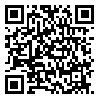BibTeX | RIS | EndNote | Medlars | ProCite | Reference Manager | RefWorks
Send citation to:
URL: http://journal.muq.ac.ir/article-1-163-en.html
2- Assistant Professor of Sport Physiology, Faculty of Physical Education & Sport Sciences, Alzahra University, Tehran, Iran.
3- Associate Professor of Biochemistry, Department of Biochemistry, Faculty of Sciences, Alzahra University, Tehran, Iran.
4- Associate Professor of Sport Physiology, Faculty of Physical Education & Sport Sciences, University of Tehran, Tehran, Iran.
5- Master of Sciences in Geophysics, Office of Education District 4, Qom, Iran.
Background and Objectives: Probiotics are live microorganisms, which if administered in adequate amounts,have beneficial effects on host health. Probioticsreduces the risk of developing diseases in the consumers through prevention of the immunosuppressive effects. The present study was performed with the purpose of comparing the effect of probiotic supplementation on the immune response in male athletes, before and after exhaustive exercise. Methods: In a double-blind study, 16 male athlete volunteers aged between 19-25 years were assigned into two groups of experimental and placebo. Subjects of the experimental and placebo respectively tooktwo capsules of probiotic or placebo daily for 30 days. Blood samples of the participants were collected at the beginning and on the 30th day, and the numbers of lymphocytes, monocytes, granulocytes, serum CRP, and serum IgA were measured. Data were analyzed using repeated measurement method and independent t-test. Results: Consumption of probiotics supplement in the rest levels in the intragroup and intergroup comparison,only showed significant difference (p<0.05) in the monocytes levels compared to base line level.Also, after the exhaustive exercise, a statistically significant difference was observed in the levels of monocytes, granulocytes, and lymphocytes compared to the baseline levels.In the comparison between the probiotic and placebo groups,only the monocytes level were significantly different (p<0.05). Other variables had nosignificant differences. Conclusion: The results of this study showed that probiotic consumption following exhaustive exercise can cause increase infactors of lymphocyte, monocyte, and geranolocyte, thereforeit seems that probiotics play a role in the development of immune system.
Received: 2016/02/13 | Accepted: 2016/02/23 | Published: 2016/02/23
| Rights and permissions | |
 |
This work is licensed under a Creative Commons Attribution-NonCommercial 4.0 International License. |







